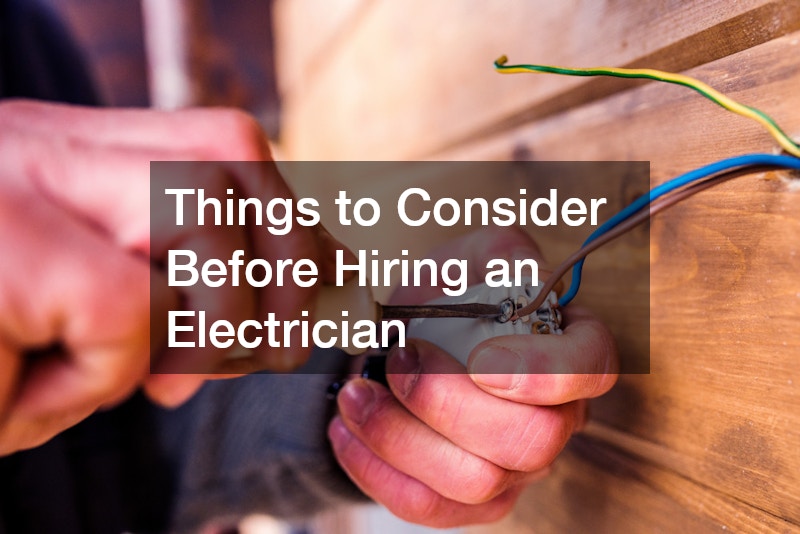Whether you’re renovating, building or simply dealing with faulty power points, choosing the right professional to handle your electrical work is crucial. A rushed or poorly informed decision can lead to substandard results, safety risks or unnecessary expenses. Taking the time to assess your options will save you time, money and stress in the long run.
This guide outlines the most important factors to consider before hiring an electrician, ensuring you receive quality service that meets safety standards and your project needs.
Licensing & Accreditation
One of the most critical aspects to check is whether the tradesperson holds a valid electrical licence. In Australia, all electrical work must be carried out by a licensed professional.
Licensing requirements vary slightly between states and territories, but all electricians must have completed the necessary training and hold public liability insurance.
You can verify a license by checking with your local government authority or electrical licensing board. Additionally, it’s worth asking whether the tradesperson is a member of an industry body such as the National Electrical & Communications Association (NECA). Membership in professional organisations often reflects a commitment to standards and continued development.
Experience & Specialisation
Not all electrical work is the same. Some professionals specialise in domestic jobs, while others focus on commercial or industrial settings. When comparing providers, consider their previous experience with the type of work you need completed.
For example, rewiring a home requires different skills and tools compared to installing a security system or setting up smart home technology. Ask for examples of past projects or client references to gauge whether the provider has relevant experience.
Also, consider how long the professional has been operating. A well-established service with a track record in your area is often a safer bet than someone newly entering the industry.
Insurance & Safety Standards
Electrical work involves significant safety risks if not done correctly. Confirm that the person or company you hire has current insurance policies, including public liability and worker’s compensation. These policies protect you and your property in the event of an accident.
You should also ensure the contractor complies with current Australian safety standards, including AS/NZS 3000 (commonly known as the Wiring Rules). Don’t hesitate to ask how they approach safety on the job, particularly when working in homes with young children or elderly residents.
Quotes & Transparency
Price is always a factor, but it shouldn’t be the only consideration. Before agreeing to any work, request a detailed written quote. The quote should break down all expected costs, including labour, parts and any potential additional fees.
Avoid vague pricing or verbal agreements. Transparent quoting helps you compare providers fairly and protects you from surprise costs later on. Be cautious of quotes that seem unusually low—this may indicate shortcuts in materials, experience or compliance.
It’s also helpful to ask about warranties on both labour and materials. A reputable tradesperson will back their work and clarify what guarantees are in place should something go wrong.
Communication & Professionalism
Good communication is a key indicator of professionalism. Pay attention to how promptly your enquiry is answered, how clearly the provider explains your options and whether they arrive on time for consultations or assessments.
A reliable service will take the time to understand your needs, offer practical advice and explain any safety or technical considerations. Polite, clear and professional communication sets the tone for the entire working relationship.
Availability & Turnaround Time
Electrical issues can range from urgent faults to long-term renovations. It’s important to confirm availability before committing. Ask whether the provider can start within your required time frame and how long the work is expected to take.
Some providers book weeks in advance, while others offer 24/7 emergency callouts. Make sure the timeline matches your expectations and clarify whether after-hours or weekend work incurs additional charges.
Local Knowledge & Reviews
Hiring someone local can offer benefits such as faster response times, familiarity with local regulations and a better understanding of common electrical issues in the area. A local provider is also more likely to rely on word-of-mouth referrals, meaning customer satisfaction is often a top priority.
Check online reviews on platforms such as Google, ProductReview or social media. Look for consistent patterns in feedback, such as punctuality, reliability and workmanship. Keep in mind that one or two negative reviews don’t necessarily reflect overall quality—but multiple complaints on the same issue may be a red flag.
Hiring the right electrician goes beyond choosing the cheapest quote. Licensing, experience, safety practices and communication all play a role in ensuring a successful outcome. By taking the time to assess your options thoroughly, you reduce the risk of poor workmanship and increase your peace of mind.
Remember to verify licences, ask the right questions and review past work where possible. A trusted professional not only solves immediate issues but becomes a go-to contact for future electrical needs. Making a careful, informed decision will serve you well long after the job is done.
.

